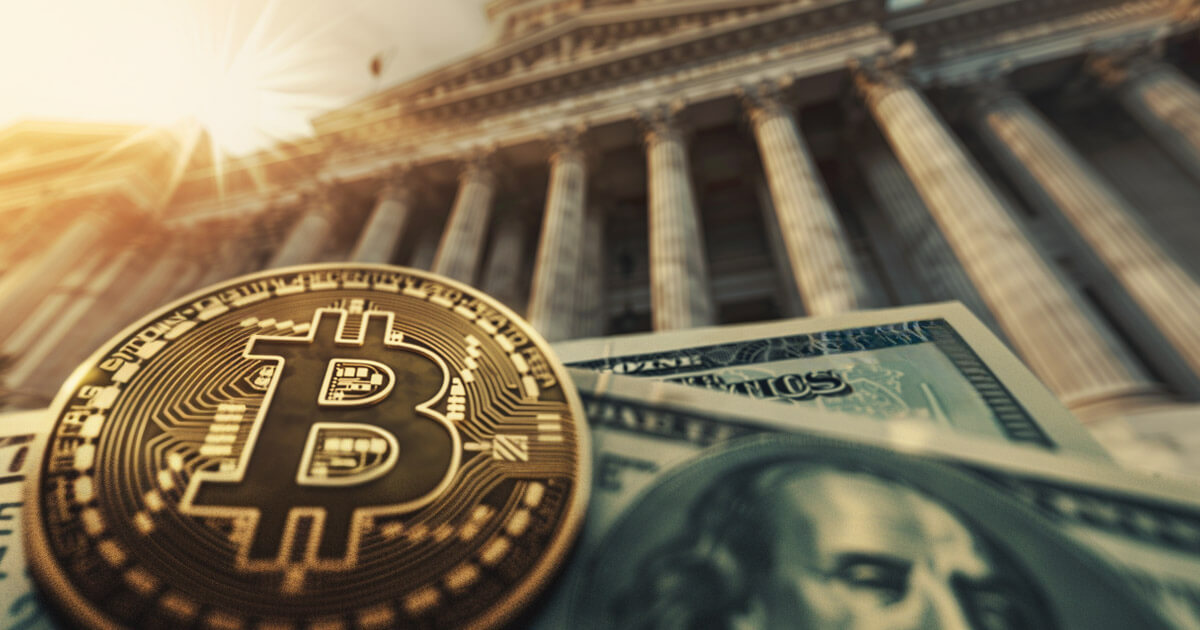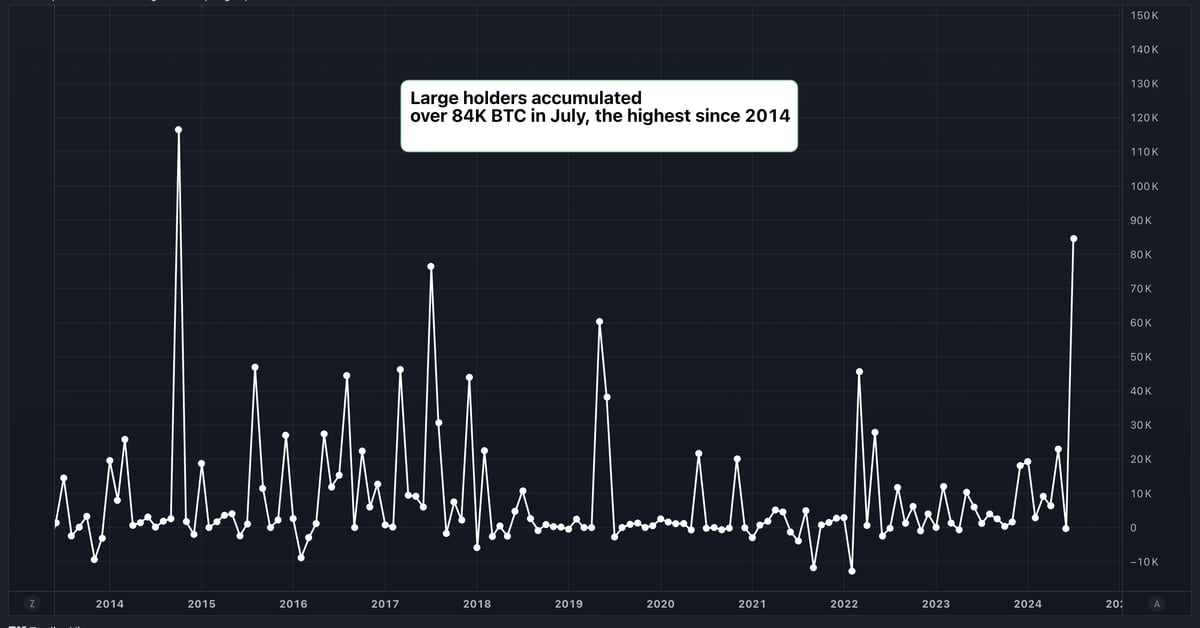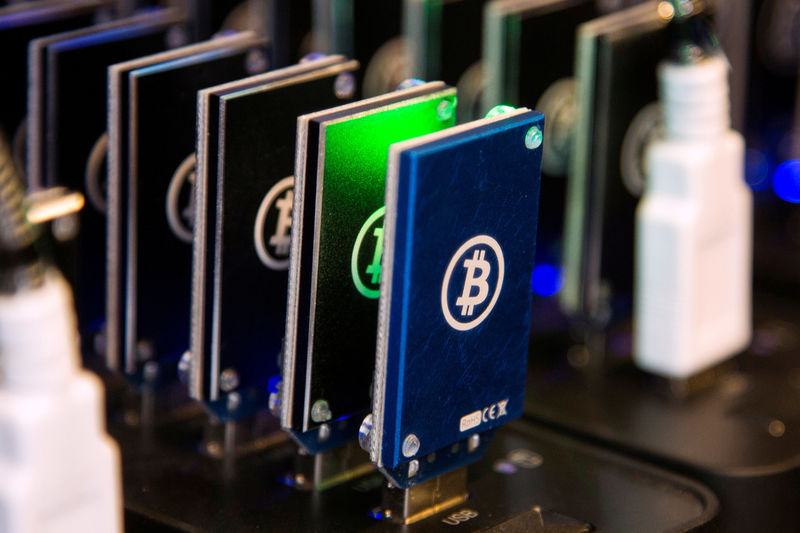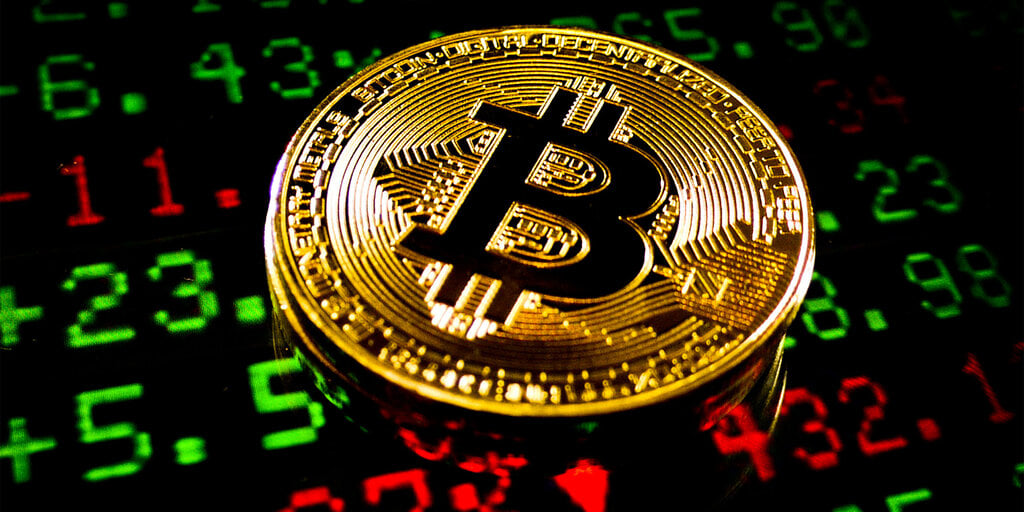Bitcoin
Can Trump do this and what would it mean?

Former US President Donald Trump is rumors is reportedly planning to announce its desire to make Bitcoin a “strategic reserve asset” during an upcoming cryptocurrency conference, a move that could significantly impact the digital asset’s status and global value.
CryptoSlate reported The potential for such a move was raised on July 4 after Bitcoin SoftWar author Jason P Lowery responded cryptically to the thread after confirming that Trump’s team had contacted him. Lowery has now deleted all tweets related to Bitcoin and Trump, something he is known for doing.
Former US President Donald Trump is set to deliver a keynote address at the Bitcoin 2024 Conference in Nashville from July 25 to 27, sparking speculation about a possible game-changing announcement. Dennis Porter, co-founder of the Satoshi Action Fund, claims to have received information from reliable sources suggesting that Trump may unveil Bitcoin as a strategic reserve asset for the United States.
This high-profile move represents a significant shift from Trump’s previous strategy. anti-crypto stancealigning with his recent pro-bitcoin rhetoric and the addition of crypto-friendly Senator J.D. Vance as his potential vice presidential candidate for the 2024 election.
Is there precedent for Bitcoin as a reserve asset?
The concept of reserve assets has evolved significantly over time, with various commodities and currencies playing this role throughout history. Gold played a central role as a reserve asset for centuries, underpinning the global monetary system until the collapse of the Bretton Woods system in the early 1970s. In the modern era, foreign currency reserves, particularly US dollars, have become the predominant form of reserve assets for most countries.
The shift from commodity-based reserves to fiat currency reserves reflected changing economic realities and the need for more adaptive monetary policies. Historical experience suggests that when certain assets are designated as liquidity stocks, institutions tend to accumulate them during crises, potentially disrupting market functioning.
The collapse of the Bretton Woods system marked the end of the post-World War II era of fixed exchange rates and ushered in a new period of floating rates and greater financial globalization. While it created challenges, it also allowed for greater flexibility in international monetary policy and helped economies adjust to external shocks such as the oil crises of the 1970s.
The Impact of Making Bitcoin a Reserve Asset
The US government currently holds a substantial amount of Bitcoin, about 213,000 BTCacquired primarily through seizures from illicit actors. This existing stockpile of $14.3 billion could be leveraged if Bitcoin were declared a strategic reserve asset. Using these seized assets to fund a Bitcoin reserve could effectively utilize these holdings without requiring additional purchases on the open market.
Designating Bitcoin as a strategic reserve asset would have far-reaching implications for the United States and the global financial system. It would encourage Bitcoin’s “digital gold” narrative and increase economic resilience and stability. Such a decision could significantly increase Bitcoin’s legitimacy, attracting new investors and potentially increasing its price.
The geopolitical implications of this change are substantial. Trump has previously warned that the policies against Bitcoin could benefit adversaries like China and Russia, suggesting that embracing Bitcoin could be seen as a strategic advantage for the United States. This perspective aligns with the broader argument that as Bitcoin gains value, countries can compete to accumulate itsimilar to other scarce commodities such as gold, silver, platinum and oil reserves.
From an economic perspective, incorporating Bitcoin into the U.S. Treasury’s holdings could diversify the nation’s assets and potentially hedge against inflation. This approach could reshape monetary policy and influence how other countries manage their own reserves.
The impact on the digital asset market and regulatory landscape would be profound. Such a policy shift could lead to more comprehensive and favorable regulatory frameworks for cryptocurrencies, potentially accelerating their widespread adoption. However, implementing such a policy would face significant challenges.
The technical aspects of securely storing and managing large amounts of Bitcoin at a national level would require careful consideration and robust security measures.
It is important to note that while these potential implications are based on reliable sources and expert opinionsThe actual announcement and implementation of Bitcoin as a strategic reserve asset remains speculative at this point. The full impact of such a decision would only become apparent if and when it is officially enacted and integrated into U.S. financial policy.
How are new reserve assets confirmed?
The process of confirming new reserve assets in the United States involves complex decision-making at the highest levels of government and financial institutions. Traditionally, the U.S. Department of the Treasury, in coordination with the Federal Reserve, has had primary authority over the management of the nation’s reserve assets.
Any significant changes to the composition of reserve assets would likely require congressional approval and involve extensive deliberation among policymakers, economists, and financial experts. The Federal Reserve, as the central bank, plays a crucial role in conducting monetary policy and managing the nation’s reserves. It has the authority to purchase various securities and assets as part of its operations.
However, introducing a new type of reserve asset, especially one as unconventional as Bitcoin, would be unprecedented and would likely require new legislation or significant policy changes. The process would involve a thorough analysis of the asset’s stability, liquidity, and potential impact on the overall financial system, as well as considering geopolitical implications and alignment with national economic strategies.
Would Trump have the authority to declare Bitcoin a reserve asset?
As president, Trump would have significant influence over economic policy, but declaring Bitcoin a strategic reserve asset would likely require a complex process involving multiple government agencies.
The president does not have unilateral authority to make such a decision. It would likely require congressional approval and coordination with the Federal Reserve and the Treasury Department. The process would involve extensive deliberation among policymakers, economists and financial experts.
Any major change to the composition of reserve assets would need to be carefully analyzed for its potential impact on financial stability, monetary policy, and international relations. While a president can set the tone and direction of economic policy, implementing Bitcoin as a reserve asset would require navigating regulatory frameworks, potentially creating new legislation, and gaining support from key financial institutions.
The President’s role would be more to defend and initiate the process than to declare it unilaterally.
Definition of Reserve Assets
Reserve assets are financial instruments that a country’s central bank or monetary authority holds and that can be quickly converted into cash to meet balance of payments needs, intervene in foreign exchange markets, or deal with economic emergencies. These typically include gold, foreign currencies, special drawing rights (SDRs) issued by the International Monetary Fund (IMF), and a country’s reserve position with the IMF.
The primary function of reserve assets is to provide liquidity to manage imbalances in international payments and regulate exchange rates. They also maintain confidence in the national currency, satisfy legal requirements, and can be used as collateral for international loans.
The composition and management of reserve assets play a crucial role in a country’s economic stability and in its relationship with international financial institutions, such as the IMF.
Mentioned in this article
Bitcoin
‘This is huge’ — Billionaire Mark Cuban issues ‘incredible’ Bitcoin and crypto prediction amid price slump

Bitcoin has surged again this year under former President Donald Trump Cryptocurrency boosts US presidential election in November with ‘revolutionary’ plan.
The price of bitcoin has surged to more than its all-time high in recent months, surpassing $70,000 per bitcoin and triggering a wave of mega-optimistic predictions about the price of bitcoinalthough it fell again this week to below $65,000 after the Federal Reserve kept interest rates steady.
Now, as Elon Musk suddenly breaks his silence on bitcoin and cryptocurrenciesBillionaire investor Mark Cuban called a California plan to digitize 42 million car titles using blockchain an “incredible step forward” and “huge” for cryptocurrencies.
Sign up for free CryptoCodex now—A daily five-minute newsletter for traders, investors, and crypto curious people that will keep you up to date and ahead of the bitcoin and crypto bull market
Mark Cuban, famous Shark Tank investor and billionaire owner of the NBA team Dallas Mavericks, has… [+] called a cryptocurrency update “amazing” amid bitcoin’s price slump.
Getty Images
The California Department of Motor Vehicles (DMV) has digitized 42 million car titles using blockchain, it was reported by Reuters, through technology company Oxhead Alpha on the Avalanche blockchain and designed to detect fraud and facilitate the securities transfer process.
“This is an incredible development for crypto,” Cuban, best known as an investor on TV’s Shark Tank and owner of the Dallas Mavericks NBA team, posted on X, joking that U.S. Securities and Exchange Commission (SEC) Chairman Gary Gensler could sue the state as part of his hostility toward cryptocurrencies and blockchain technology.
“The reason this is huge for crypto is because people who hold the tokens will have an app with an Avalanche wallet,” Cuban said. “Tens of millions of Californians having and using a crypto wallet in the next five years, or however long it takes, normalizes the use of wallets and crypto.”
John Wu, president of Avalanche developer Ava Labs, told Reuters that California’s DMV is “creating a wallet that you can download on your phone.”
Sign up for CryptoCodex now—A free daily newsletter for the crypto-curious
Bitcoin’s price has rallied this year, triggering a wave of bullish bitcoin price predictions from… [+] people like billionaire Mark Cuban.
Forbes Digital Assets
Last month, Cuban predicted that if the US dollar falls as the global reserve currency, bitcoin could become “a global ‘safe haven’” and a “global currency.” potentially sending the price of bitcoin to a much higher level.
According to Cuban, bitcoin could become what its most ardent supporters “envision” — a means “of protecting our economies… This is already happening in countries facing hyperinflation.”
The price of bitcoin has skyrocketed over the past year, largely due to the world’s largest asset manager, BlackRock, leading a bitcoin attack on Wall Street.
Bitcoin
Large Bitcoin (BTC) Holders Added $5.4 Billion Worth of BTC in July, Data Shows

Please note that our Privacy Policy, terms of use, cookiesIt is do not sell my personal information Has been updated.
CoinDesk is a awarded media outlet that covers the cryptocurrency industry. Its journalists follow a strict set of editorial policies. In November 2023, CoinDesk has been acquired by the Bullish group, owner of Optimistica regulated digital asset exchange. The Bullish Group is majority owned by Block.one; both companies have interests CoinDesk has a portfolio of blockchain and digital asset businesses and significant holdings of digital assets, including bitcoin. CoinDesk operates as an independent subsidiary with an editorial board to protect journalistic independence. CoinDesk employees, including journalists, may receive options in the Bullish group as part of their compensation.
Bitcoin
Peter Schiff criticizes Michael Saylor’s Bitcoin hype by U.Today

U.Today – Renowned economist and cryptocurrency critic Peter Schiff has criticized Michael Saylor’s recent hype about the growing adoption of cryptocurrencies as a strategic treasury asset by corporations.
Michael Saylor, a well-known Bitcoin advocate and president of MicroStrategy, recently shared his enthusiasm on X about the growing adoption of Bitcoin as a strategic treasury asset.
Citing a comment made by Bitcoin investor Bill Miller in a recent interview with CNBC, Saylor tweeted: “We now have more companies coming forward and saying we will put Bitcoin on our balance sheet as a strategic treasury asset.”
However, not everyone shares Saylor’s enthusiasm. Schiff, a vocal Bitcoin critic and gold bull, was quick to respond with his usual skepticism. In a pointed tweet, Schiff argued: “Bitcoin is neither strategic nor appropriate as a treasury asset. Companies should not risk shareholder funds. They should pay dividends and let shareholders risk their own money.”
Bitcoin enthusiasts are not intimidated
However, Schiff’s criticism shouldn’t deter Bitcoin enthusiasts, who often take Schiff’s words with a pinch of salt. To put things in context, Michael Saylor began buying Bitcoin in 2020 as an inflation hedge and alternative to money. Saylor’s company, MicroStrategy, is among the largest public holders of Bitcoin in the world. As of June 20, it held 226,331 BTC, purchased for around $8.33 billion at an average price of $36,798.
Over the weekend, Schiff was surprised when 87% of the more than 11,000 Bitcoin holders who responded to his X survey said they would not sell any of their Bitcoin even if the price dropped more than 99% to $120. They said not only would they not sell, but that they would continue to buy even when prices dropped.
Schiff unexpectedly revealed that “the main selling point for investors to buy Bitcoin is its excellent past performance record.”
At the time of writing, Bitcoin is trading at $66,067, having reached all-time highs of nearly $74,000 in mid-March.
Bitcoin
Bitcoin Falls as ETF Flows Reverse, Mt. Gox Moves Billions

In a week of drastic fluctuations, the price of Bitcoin (BTC) has retreated from its highs and is currently trading at US$66,250, down 0.9% in European trading.
This volatility comes on the heels of a significant surge above $70,000 earlier in the week, fueled by former President Donald Trump’s ambitious cryptocurrency plans announced in a Bitcoin Conference in Nashville.
Trump’s announcement to fire Securities and Exchange Commission Chairman Gary Gensler and establish a strategic Bitcoin reserve if elected president has temporarily sent the cryptocurrency market into a frenzy.
However, the excitement was short-lived as a series of events unfolded which caused investor sentiment to sour.
A significant sell-off of about 8% was triggered when the US Marshals Service moved $2 billion in Bitcoin for new wallets.
This move has reignited fears of a potential large-scale liquidation, compounded by lingering concerns over a possible Bitcoin liquidation from Mt. Gox. Early this morning, Mt. Gox administrator transferred US$2.2 billion value of your BTC assets in a new wallet.
Meanwhile, the US Bitcoin ETF spot market is showing signs of fluctuation, according to data from SoSo Value. On July 30, Bitcoin spot funds experienced their first net outflow in five days, totaling $18.3 million.
The Grayscale Bitcoin Trust (GBTC) saw outflows of $73.6 million, while the BlackRock iShares Bitcoin Trust (IBIT) attracted $74.9 million in inflows. But outflows from other funds left the category in the red at the end of Tuesday’s trading session. The total net asset value of spot Bitcoin ETFs currently stands at a substantial $58.5 billion.
In other crypto news, Ripple (XRP) is up 8.6% in the past 24 hours, hitting over 64 cents – its highest point since March 25, according to CoinGecko. data.
This rally comes amid a scheduled token unlock and growing optimism around a potential deal in the long-running SEC vs. Ripple lawsuit.
The crypto community is closely watching the SEC’s actions, particularly its intention to amend its complaint against Binance regarding “Third-Party Cryptocurrency Securities,” which some interpret as a positive sign for Ripple.
On a market analysis noteSingapore-based cryptocurrency trading desk QCP Capital wrote that while election headlines continue to dominate, several crucial macroeconomic events loom on the horizon.
“Election headlines will continue to be a key focus, but several key macroeconomic events are also on the horizon. Key events starting with the FOMC meeting on Wednesday, megacap tech earnings (Apple, Amazon, Meta) throughout the week, and unemployment data on Friday,” QCP Capital wrote.
Edited by Stacy Elliott.
-

 Regulation12 months ago
Regulation12 months agoRipple CTO and Cardano founder clash over XRP’s regulatory challenges ⋆ ZyCrypto
-

 Regulation10 months ago
Regulation10 months agoNancy Pelosi Considers Supporting Republican Crypto Bill FIT21 – London Business News
-

 Videos11 months ago
Videos11 months agoCryptocurrency News: Bitcoin, ETH ETF, AI Crypto Rally, AKT, TON & MORE!!
-

 Regulation11 months ago
Regulation11 months agoBitcoin’s future is ‘bleak’ and ripe for regulation, says lead developer
-

 News8 months ago
News8 months agoAave Price Increases Following Whales Accumulation and V3.1 Launch
-

 Regulation8 months ago
Regulation8 months agoSouth Korea Imposes New ‘Monitoring’ Fees on Cryptocurrency Exchanges
-

 Regulation8 months ago
Regulation8 months agoA Blank Sheet for Cryptocurrencies: Kamala Harris’ Regulatory Opportunity
-

 Regulation8 months ago
Regulation8 months agoCryptocurrency Regulations in Slovenia 2024
-

 News11 months ago
News11 months agoThe trader earned $46 million with PEPE after reaching a new ATH
-

 Regulation11 months ago
Regulation11 months agoCrypto needs regulation to thrive: Tyler Cowen
-

 Blockchain11 months ago
Blockchain11 months agoSolana ranks the fastest blockchain in the world, surpassing Ethereum, Polygon ⋆ ZyCrypto
-

 Blockchain11 months ago
Blockchain11 months agoSolana Surpasses Ethereum and Polygon as the Fastest Blockchain ⋆ ZyCrypto





